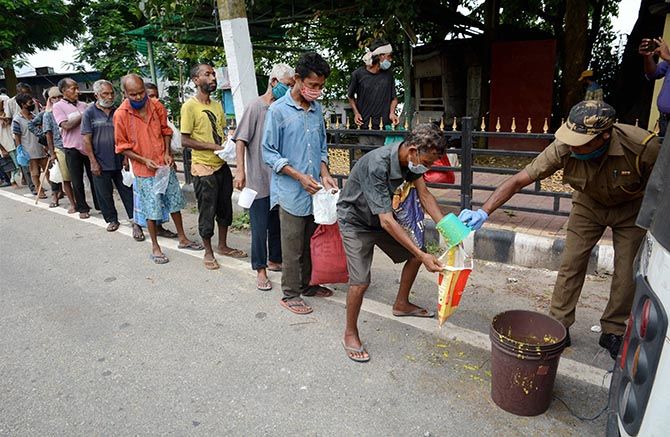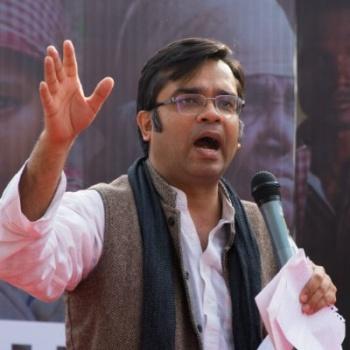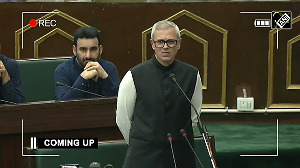'Inequality has been growing in the world. The virus has only amplified it.'

The latest Oxfam report reveals some startling facts about the state of the global economy in the coronarivus pandemic. Like, the top 10 billionaires in the world added $500 billion to their wealth just during the pandemic.
And on the other hand, "some 450 million people in India are on the verge of sliding back to poverty," Amitabh Behar, CEO, Oxfam India, tells Shobha Warrier/Rediff.com.
- Part 1: A worker would take 10,000 years to earn what Mukesh Ambani made in an hour during the pandemic
What did you find as the major reason why the poor became poorer -- loss of livelihood or health? Once when I interviewed Dr Rajagopal, an expert on palliative care, who said that healthcare is so expensive that while it saves lives, it destroys more lives socially and financially.
Yes, the doctor is right. Some studies show that a very large number of people are just one illness away from going below the poverty line.
Why do we have such poor healthcare system that poor people have to take loans to pay their hospital bills? Healthcare should be something that the State should provide to its citizens.
But during the pandemic, health was not the reason why they became poorer. It is the lockdown which led to the shutdown of the economic system. The lockdown had a cascading effect. It affected the livelihood of lakhs of people.
Sadly, we could control the virus to some extent but we couldn't control the economy.
The bailout packages the government came out with were extremely inadequate. It was basically in the form of incentives.
The government should have given direct cash support to the poor to kickstart their lives again.
When people were hungry and there was no food on the table, they were told, we would give you loans.

Photograph: Kind courtesy Amitabh Behar/Twitter.
But the government says it handled the lockdown well...
Do you know 170,000 people lost their jobs and livelihood every hour in April? So, how can they say they handled the lockdown well?
Then, for the first time, we saw an economic contraction of almost a quarter.
No other country experienced a contraction of this magnitude.
Then happened the migration of millions of migrant labourers; something the country had witnessed only during Partition.
It is the informal sector that employs 92% of India's workforce that got affected the most and among them, women were affected even more.
The unemployment rate of women was 15% more than what it was during the pre-pandemic levels.
The head of the World Food Program warned that we were going to see famines of biblical proportions in 2021. India is at the 94th position out of 107 countries in the Hunger Index. What kind of future awaits us?
Yes, it is going to be a very, very difficult future. That is why we are saying, we need a different set of economic policies.
A study by ILO says, 450 million people in India are on the verge of sliding back to poverty. It means all the good work done in the last 20 years to uplift the poor, will be over 450 million is not a small number.
Study after study has shown that investing in health and education is the best driver of an equal society. You look at Norway, Finland, Sweden they all have invested heavily in health and education.
Now another startling figure. India is 4th from the bottom in terms of its investment in healthcare.
Where will this extreme inequality lead to?
The trend was visible earlier too; that inequality has been growing in the world. The virus has only amplified it.
Like the secretary-general of the UN said, the virus has played the role of an X-ray and has shown us the inequalities of our society clearly.
Feature Presentation: Rajesh Alva/Rediff.com











 © 2025
© 2025